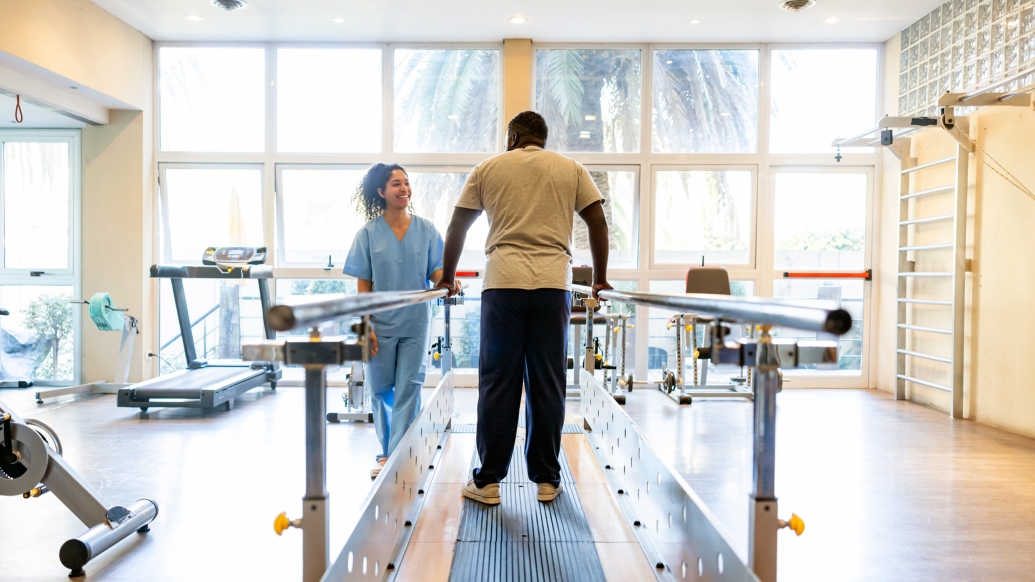Michigan claims data reveals underuse of an effective intervention
10:07 AM
Author |

Rehabilitation, or rehab, can help patients who are recovering from an injury or illness manage their conditions and get back to doing the things they love.
However, new data suggests that patients who have been hospitalized for chronic obstructive pulmonary disorder may be missing out on this beneficial step in the healing process.
An exacerbation of COPD is a sudden worsening of symptoms, including shortness of breath, and cough, which can be fatal.
COPD exacerbations led to more than 335,000 hospitalizations in the United States in 2020.
Studies have shown that pulmonary rehabilitation for COPD can improve quality of life and reduce hospital readmissions.
Michael Thompson, Ph.D., of the Department of Cardiac Surgery at Michigan Medicine worked with U-M surgery resident Whitney W. Fu, M.D., and a team of pulmonologists, general surgeons and clinical researchers to analyze whether patterns of rehab use observed in patients hospitalized for cardiac procedures would be mirrored in patients hospitalized for exacerbations of COPD.
Although rehab improves outcomes for both pulmonary and cardiac patients, usage remains low.
The picture was even bleaker than expected: The overall initiation rate for pulmonary rehab in patients recovering from a COPD hospitalization was just 0.8%.
“We knew things were bad, but obviously we didn’t know things were this bad,” said Thompson.
The team’s insights emerged from claims data from the Michigan Value Collaborative, a Blue Cross Blue Shield of Michigan funded collaborative quality initiative that includes over 100 acute care hospitals and 40 physician organizations across the state of Michigan.
Just over 36,000 patients and 99 hospitals for hospitalizations between 1/1/18-12/31/21 were included in their specific study.
Most of the patients were older than 65, female, white and insured via Medicare, which covers the costs associated with pulmonary rehab.
And while the investigators had hoped the data would reveal characteristics at high-performing hospitals to improve use of pulmonary rehabilitation, there were no high performing hospitals.
“We’re at ground zero in trying to improve awareness and talking to physicians and patients about pulmonary rehab,” he said.
A model for improvement could come from work done to promote cardiac rehabilitation, notes Thompson, which has usage rates of around 30% for patients recovering from heart procedures.
Hospital differences in cardiac rehab are largely practice driven and center specific, bolstered by standard referral packages built into the electronic health record.
Similar tactics could be applied for pulmonary rehab, he adds.
While the COPD findings are only of hospitals based in Michigan, notes Thompson, other national studies have found similar results.
“Our initial takeaway here is that we can start by doing just the bare minimum,” he said.
Although Blue Cross Blue Shield of Michigan and the Michigan Value Collaborative work collaboratively, the opinions, beliefs and viewpoints expressed by the authors do not necessarily reflect the opinions, beliefs, and viewpoints of BCBSM or any of its employees.
Additional authors: Kristin P. Hassett, Wassim W. Labaki, Thomas S Valley
Paper cited: “Use of Pulmonary Rehabilitation After COPD Hospitalization: An Analysis of Statewide Patient and Hospital Data,” Annals of the American Thoracic Society. DOI: 1.1513/AnnalsATS.202402-196OC
Sign up for Health Lab newsletters today. Get medical tips from top experts and learn about new scientific discoveries every week.
Sign up for the Health Lab Podcast. Add us wherever you listen to your favorite shows.

Explore a variety of health care news & stories by visiting the Health Lab home page for more articles.

Department of Communication at Michigan Medicine
Want top health & research news weekly? Sign up for Health Lab’s newsletters today!




